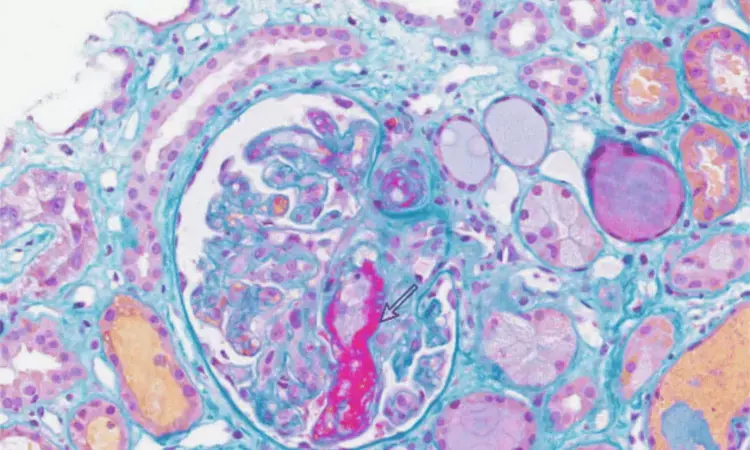- Home
- Medical news & Guidelines
- Anesthesiology
- Cardiology and CTVS
- Critical Care
- Dentistry
- Dermatology
- Diabetes and Endocrinology
- ENT
- Gastroenterology
- Medicine
- Nephrology
- Neurology
- Obstretics-Gynaecology
- Oncology
- Ophthalmology
- Orthopaedics
- Pediatrics-Neonatology
- Psychiatry
- Pulmonology
- Radiology
- Surgery
- Urology
- Laboratory Medicine
- Diet
- Nursing
- Paramedical
- Physiotherapy
- Health news
- Fact Check
- Bone Health Fact Check
- Brain Health Fact Check
- Cancer Related Fact Check
- Child Care Fact Check
- Dental and oral health fact check
- Diabetes and metabolic health fact check
- Diet and Nutrition Fact Check
- Eye and ENT Care Fact Check
- Fitness fact check
- Gut health fact check
- Heart health fact check
- Kidney health fact check
- Medical education fact check
- Men's health fact check
- Respiratory fact check
- Skin and hair care fact check
- Vaccine and Immunization fact check
- Women's health fact check
- AYUSH
- State News
- Andaman and Nicobar Islands
- Andhra Pradesh
- Arunachal Pradesh
- Assam
- Bihar
- Chandigarh
- Chattisgarh
- Dadra and Nagar Haveli
- Daman and Diu
- Delhi
- Goa
- Gujarat
- Haryana
- Himachal Pradesh
- Jammu & Kashmir
- Jharkhand
- Karnataka
- Kerala
- Ladakh
- Lakshadweep
- Madhya Pradesh
- Maharashtra
- Manipur
- Meghalaya
- Mizoram
- Nagaland
- Odisha
- Puducherry
- Punjab
- Rajasthan
- Sikkim
- Tamil Nadu
- Telangana
- Tripura
- Uttar Pradesh
- Uttrakhand
- West Bengal
- Medical Education
- Industry
Use of Bevacizumab in Lung Cancer Patient linked to rare kidney complication: Case Report

China: A team from The Second Clinical College of Guangzhou University of Chinese Medicine, led by Rui Jiang, has documented a rare case of bevacizumab-associated glomerular microangiopathy (Bmab-GMA) in BMC Nephrology, adding to growing evidence of serious kidney-related side effects tied to the cancer drug.
The case involved a 59-year-old man with stage IIIA right lung adenocarcinoma who underwent surgery in 2021, followed by targeted treatment with bevacizumab after developing metastatic disease in 2023. Within months of initiating therapy, the patient developed new-onset high blood pressure, swelling in the lower limbs, and worsening proteinuria. Laboratory tests confirmed progressive kidney dysfunction, with rising serum creatinine levels and falling serum albumin.
Despite dose reduction and eventual discontinuation of bevacizumab, kidney damage persisted. Upon admission in April 2024, the patient’s 24-hour urine protein excretion was markedly elevated at over 4.6 g/day, while his estimated glomerular filtration rate had dropped to 41.27 mL/min/1.73 m². Blood tests also revealed increased levels of the soluble complement membrane attack complex (C5b-9), indicating possible activation of the complement system — a clue that may shed light on the disease mechanism.
Renal biopsy provided definitive evidence of Bmab-GMA. Microscopic examination revealed mesangial expansion, double-contour formation of the glomerular basement membrane, and pseudothrombotic deposits. Immunofluorescence showed deposition of multiple immunoglobulins and complement components, while electron microscopy identified subendothelial and mesangial electron-dense deposits, widening of the subendothelial space, and partial loss of podocyte foot processes.
These findings confirmed the diagnosis of bevacizumab-induced glomerular microangiopathy, a condition that can cause both acute kidney injury and nephrotic syndrome. Notably, the case mirrors previous reports linking anti-VEGF agents, such as bevacizumab, to unique patterns of renal injury.
The patient was managed with antihypertensive medication (amlodipine), diuretics for edema control, and statin therapy for lipid abnormalities. Cancer treatment was switched to pralatrexate and anlotinib. At follow-up in July 2024, his hypertension persisted, kidney function remained impaired, and proteinuria had worsened to nearly 8 g/day.
According to the authors, the case highlights several important clinical lessons:
- Oncologists and nephrologists should maintain a high index of suspicion for renal complications in patients receiving bevacizumab.
- Early detection through regular monitoring of blood pressure, kidney function, and urinary protein can help mitigate irreversible damage.
- Complement activation, as indicated by elevated C5b-9, may play a central role in the disease process and could represent a target for future therapies.
While Bmab-GMA remains rare, its potential severity makes awareness crucial. As anti-VEGF therapies continue to be widely used in oncology, further research is needed to define their pathogenesis, risk factors, and optimal management strategies.
Reference:
Jiang, R., Yu, Rz., Yang, Hf. et al. Bevacizumab-associated glomerular microangiopathy: a case report and literature review. BMC Nephrol 26, 445 (2025). https://doi.org/10.1186/s12882-025-04385-9
Dr Kamal Kant Kohli-MBBS, DTCD- a chest specialist with more than 30 years of practice and a flair for writing clinical articles, Dr Kamal Kant Kohli joined Medical Dialogues as a Chief Editor of Medical News. Besides writing articles, as an editor, he proofreads and verifies all the medical content published on Medical Dialogues including those coming from journals, studies,medical conferences,guidelines etc. Email: drkohli@medicaldialogues.in. Contact no. 011-43720751


